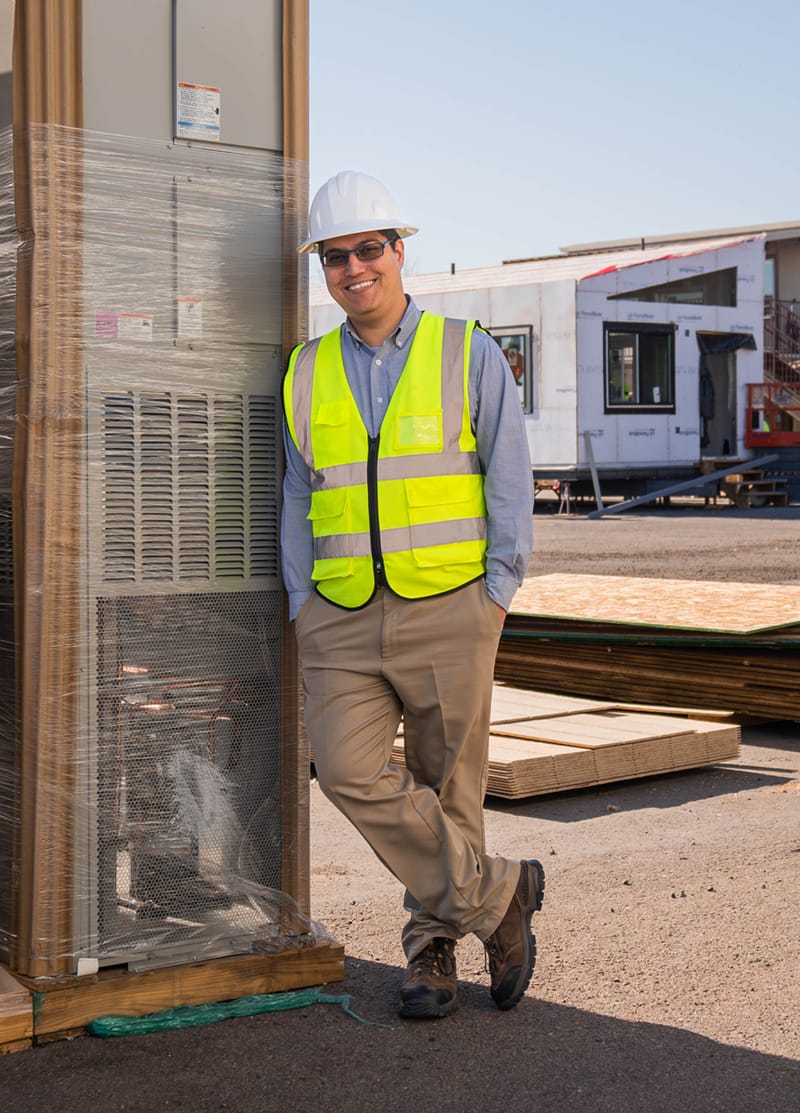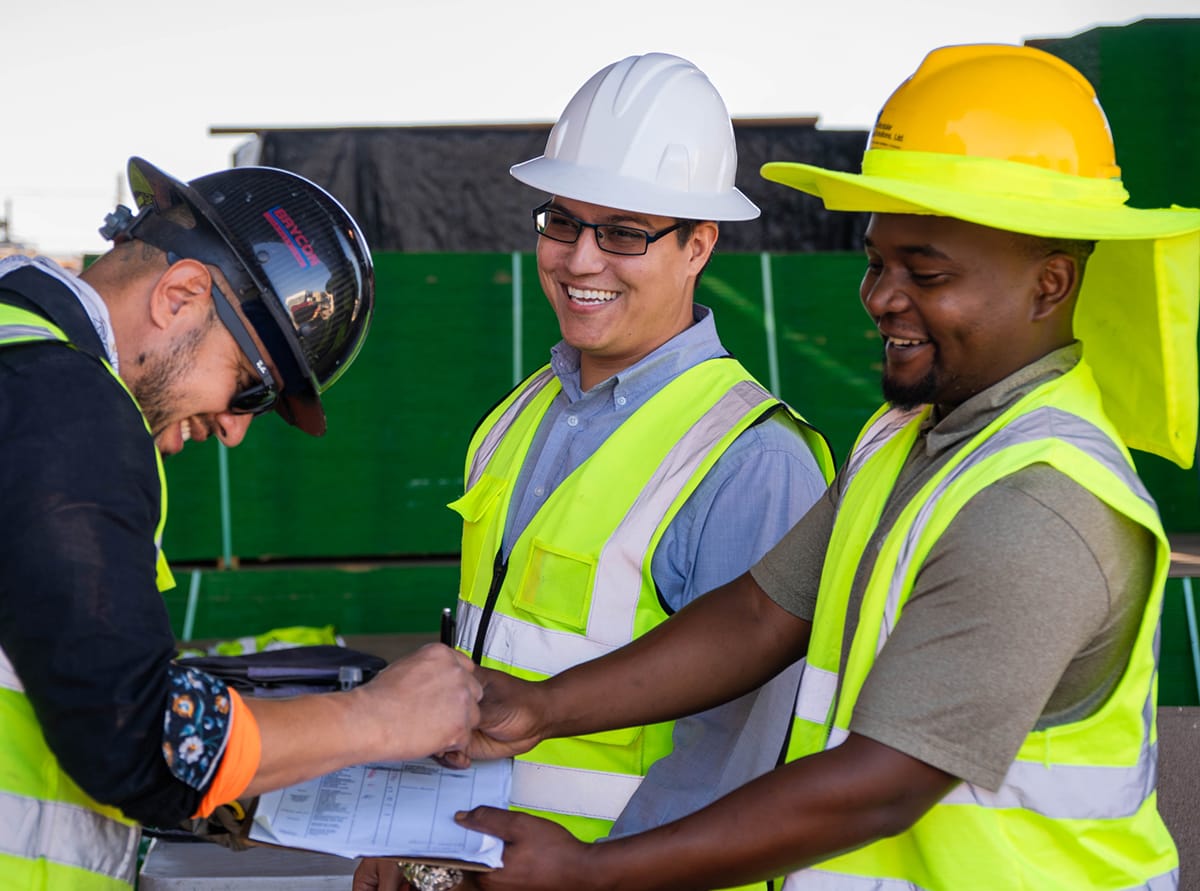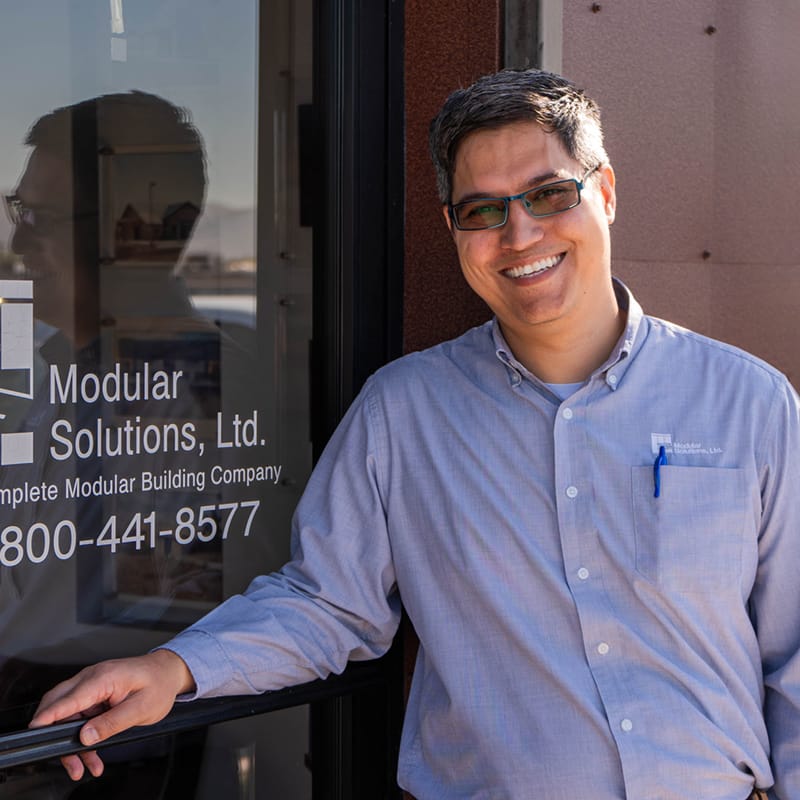Joshua Hart: Pushing Boundaries
Joshua Hart, P.E., vice president at Modular Solutions, can sum up his job responsibilities in one sentence: “I do whatever needs to be done.” Hart thrives on the variety and the opportunity to be involved in every aspect of the company. And it shows!
You might say Hart has come full circle.
He grew up working at Modular Solutions, the company his father, mother, and aunt started in 1996, doing odd jobs during summers and high school.
He thought it would be “cool” to run the company one day, but when it came time for college, he opted for a career path in engineering.
After graduating from Arizona State University with a degree in electrical engineering, he was hired by a small engineering firm where he received extensive mentoring. Within a few years, the company merged with WSP USA, a global engineering and professional service company. There, Hart worked with a variety of clients and many general contractors, learning different styles and approaches to construction.
“I had a great little seat to see how things are done in the construction industry through a lot of different eyes,” he says.
About five years ago, at age 29, Hart entertained the idea of starting his own firm. His father, Joe Hart, gave him another option: Come to work at Modular Solutions as vice president, learn the ropes, and run the company after he retired.
Modular Solutions, based in Phoenix, AZ, began as a small modular dealership. Today, it’s a full-service, design-build manufacturer serving Arizona, California, Utah, Nevada, New Mexico, and the greater Southwest. It produces custom modular buildings for a variety of commercial applications such as educational facilities, office buildings, and healthcare facilities.
“I never thought I’d be back,” Hart says.
But he is, and he’s immersed himself in learning the business and using his acquired knowledge to make it even better.
Full Steam Ahead
Hart isn’t afraid of hard work. Far from it. During the summer, he typically arrives at the plant around four in the morning to meet with production. By nine, he’s in the office and usually doesn’t leave until eight at night. During the school year, however, the father of seven daughters works shorter hours so he can devote more time to family.

Joshua Hart is vice president at Modular Solutions in Phoenix, AZ.
He is directly responsible for the architectural engineering department, quality control, and project management. He’s also actively involved in human resources—hiring, conducting employee reviews, and, in general, ensuring employees are happy on the job.
One of the favorite parts of his job is onsite client visits. He enjoys being able to oversee a client’s project from beginning to end. At WSP USA, he worked on just a portion of many huge expensive projects.
“Our projects aren’t as big or as expensive as those, but they are very cool, different processes,” Hart says. “Some of the jobs we’ve done were thought to be close to impossible, but we figured out to do them, and do them cost effectively. I really enjoy pushing the boundaries of what modular buildings are.”

Caring Leads to Success
Modular Solution’s biggest challenge is a good one to have—acquiring enough new staff to keep up with the rapidly growing workload. Fortunately, the company has a core of experienced people who help new hires grow into their respective roles and understand the industry.
Hart attributes the company’s success to the caring exhibited by this core group who have been there from the beginning and understand the industry and how the company has evolved. They are the ones who helped Hart understand the different processes and the reasoning behind them when he returned to Modular Solutions.
It’s a two-way street.
“They have given me the trust to make changes using the different processes I’ve learned,” Hart says. “It’s a great relationship.”
Many of their kids and grandkids work at the company as well.
“It’s humbling and nice to know that we’re doing a good enough job that people want to stay her and have their family work here,” Hart says.
In fact, once the team began designing and building their sleek, modern, energy-efficient homes, it quickly overtook even their established custom-building business.
Advice to Live By
Hart has had many mentors along the way who imparted great wisdom, but one piece of advice he lives by is a saying a wrestling coach once told his dad: ‘He who hesitates is lost.’
“If you sit around and wait for answers or for something to happen, you’re pretty much done,” Hart says. “You’ve got to get out there and just do it.”
For example, in his new role, Hart must communicate with people inside and outside of the company. While he’d taken a class in school and had met with clients, contractors, and consultants in his prior workplace, he realized he needed to improve his communication skills. What did he do? He joined Toastmasters.
“It’s fantastic,” he says. “It helps tremendously with communication.”
Looking Ahead
Hart is looking forward to seeing continued growth for the company over the next few years, especially in the company’s design firm and general contractor services.
He’s also looking forward to running the company, alongside his two brothers, after his father retires. He’s already mastered the basics. Next, he’ll tackle company finances, insurance, taxes, “and all that fun stuff” in preparation for running the company.
“That’s one of the reasons why I work so hard,” he says.
Over the past fifteen to twenty years, Hart’s seen a gradual increase in the acceptance of modular construction. When he talks about modular buildings, some people still think of only manufactured homes or double classrooms. It has been challenging to change the perception of what a modular building can be, but he believes acceptance will continue to grow.
“Throughout all industries, we’ve made breakthroughs on the possibilities with and advantages of modular building,” Hart says. “I think people are starting to see that, understand that, and get excited about it.”
With people like Hart advocating for modular building and pushing the boundaries of what modular building can be, there is indeed a lot to get excited about.

About the Author: Shari Held is an Indianapolis-based freelance writer who has been covering the construction industry for more than 20 years.
More from Modular Advantage
AoRa Development Aims for New York’s First Triple Net Zero Building Using Modular Methods
More cities are providing funding for newer infrastructure projects as long as they meet sustainability requirements. This is how modular can fit the bill, thanks to its lower waste production.
Developers and Designers: Lessons Learned with Modular Design
Modular construction is attractive to many developers because sitework and module construction can occur simultaneously, shortening the schedule and reducing additional costs.
UTILE: Putting Modular Building on a Fast Track
In Quebec, UTILE is taking the lead in creating affordable modular buildings to help decrease the student housing shortage. During the process, the company discovered what it takes to make the transition to modular building a success.
Sobha Modular Teaches Developers How to Think Like Manufacturers
With its 2.7 million square foot factory in UAE, Sobha Modular is bringing both its high-end bathroom pods to high-end residences to Dubai while developing modular projects for the U.S. and Australia.
RoadMasters: Why Early Transport Planning is Make-or-Break in Modular Construction
In modular construction, transportation is often called the “missing link.” While it rarely stops a project outright, poor planning can trigger costly delays, rerouting, and budget overruns.
Navigating Risk in Commercial Real Estate and Modular Construction: Insights from a 44-Year Industry Veteran
Modular projects involve manufacturing, transportation, and on-site assembly. Developers must understand exactly what they are responsible for versus what they subcontract. Risk advisors should research the developer’s contractors, subcontractors, and design-build consultants—especially the modular manufacturer.
Art²Park – A Creative Application of Modular and Conventional Construction
Art²Park is more than a park building—it’s a demonstration of what modular construction can achieve when thoughtfully integrated with traditional materials. The use of shipping containers provided not only speed and sustainability benefits but also a powerful structural core that simplified and strengthened the rest of the building.
Building Smarter: A New Standard in Modular Construction Efficiency
Rising material prices, labour shortages, expensive financing and tightening environmental rules have made conventional construction slower, costlier, and more unpredictable. To keep projects on schedule and within budget, builders are increasingly turning to smarter industrialized methods.
Resia: Breaking All the Rules
Resia Manufacturing, a division of U.S.-based Resia, is now offering prefabricated bathroom and kitchen components to industry partners. Its hybrid fabrication facility produces more precise bathroom and kitchen components (modules) faster and at lower cost than traditional construction. Here’s how Resia Manufacturing does it.
How LINQ Modular Innovates to Bring Modular To The Market in the UAE and Beyond
LINQ Modular, with an office and three manufacturing facilities in Dubai, is a modular firm based in United Arab Emirates. The company is on a mission: to break open the housing and construction markets in the Gulf Cooperation Council (GCC) area with modular.










